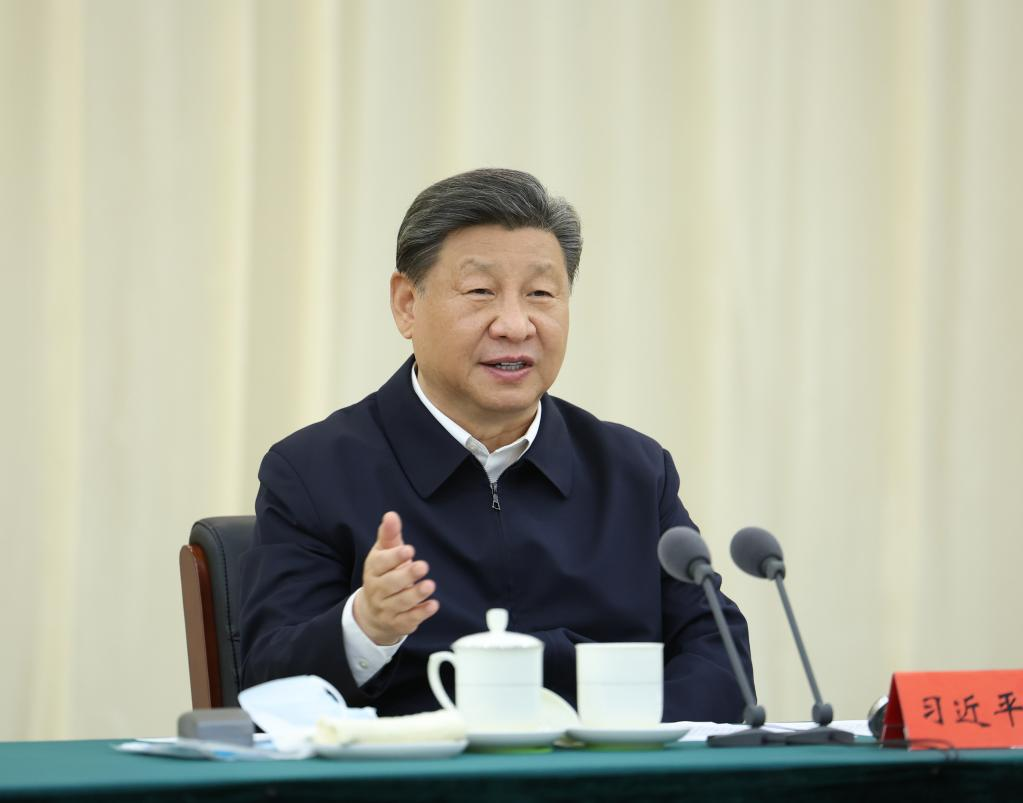Xi calls for further tackling desertification


President Xi Jinping has highlighted the significance of strengthening desertification control and prevention to develop an even stronger green shield in the nation's northern regions and secure greater outcomes in building a beautiful China.
Speaking during a meeting with officials on Tuesday in Bayannuur in the Inner Mongolia autonomous region, Xi, who is also general secretary of the Communist Party of China Central Committee and chairman of the Central Military Commission, called for sustained efforts to create new miracles in tackling desertification.
The strengthening of efforts to fight desertification and move forward with key ecological projects such as the Three-North Shelter Forest Program is a matter related to China's ecological security, the building of a strong nation and the sustained development of the Chinese nation, he said.
Xi spoke after hearing from Wang Guanghua, minister of natural resources, Sun Shaocheng, Party secretary of the Inner Mongolia autonomous region, Hu Changsheng, Party secretary of Gansu province, and Liang Yanshun, Party secretary of the Ningxia Hui autonomous region.
Xi emphasized that China has attained tremendous outcomes in its anti-desertification efforts over the past four decades through the launching of the Three-North program, the Grain for Green program and a project to tackle sandstorms in Beijing and Tianjin.
However, he pointed out that desertification remains a major global ecological problem threatening the very survival and development of mankind, with China among the hardest-hit countries in the world.
The majority of China's desertification took place in North, Northwest and Northeast China, and in less-developed areas and regions populated by ethnic minority groups, Xi said.
While recognizing the positive momentum in tackling desertification and land degradation in recent years, Xi stressed that China is still faced with a large area, wide geographical distribution and high level of desertification.
The frequency of sandstorms in northern China has increased in recent years due to climate change, he added.
The president highlighted the period from 2021 to 2030, the sixth phase of the Three-North program, as the key phase for consolidating and expanding achievements in fighting desertification.
He reiterated the need to adopt a holistic approach to conserving mountains, rivers, forests, farmland, lakes, grasslands and desert, and to prioritize the prevention and control of desertification, as part of broader steps to build up the shield for ecological security in northern China.
He set out a target to develop the Three-North program, which was launched in 1978 to hold back the expansion of the Gobi Desert, into an unbreakable green "Great Wall" within a time span of 10 years.
Xi emphasized the need to prioritize key areas and launch three major landmark anti-desertification initiatives, calling for an intensified fight against desertification in the middle reaches of the Yellow River and in regions such as the Maowusu Desert, the Kubuqi Desert and the Helan Mountains.
He also laid out a plan to tackle the Horqin and Hunshandake deserts, both in Inner Mongolia. The protection of natural forests and grasslands in the Qilian, Tianshan, Altay, Helan and Liupan mountains must be strengthened across the board, including steps to restore degraded forests and grasslands, to prevent desertification, he said.
The president also called for a scientific approach in tackling desertification and highlighted the need to ensure the proper use of water resources, which he said should serve as a decisive factor in planning greening efforts, the population of regions and production.
He called for extensive international exchanges and cooperation in fulfilling China's commitments to the United Nations Convention to Combat Desertification.
The nation will actively participate in global desertification and environmental governance efforts and strengthen cooperation with neighboring countries, supporting desertification control initiatives under the Belt and Road Initiative, he said, adding that Beijing aims to lead policy dialogues and information sharing among nations to jointly respond to sandstorms.
The meeting was held after a fact-finding trip by the president to Bayannuur on Monday and Tuesday, a visit that took him to a nature reserve, a forest farm and a water resources monitoring center.
China has created the world's largest planted forests after intense afforestation efforts over the past decades, with its forest coverage rate more than doubling from 12 percent in the early 1980s to 24.02 percent last year.
























